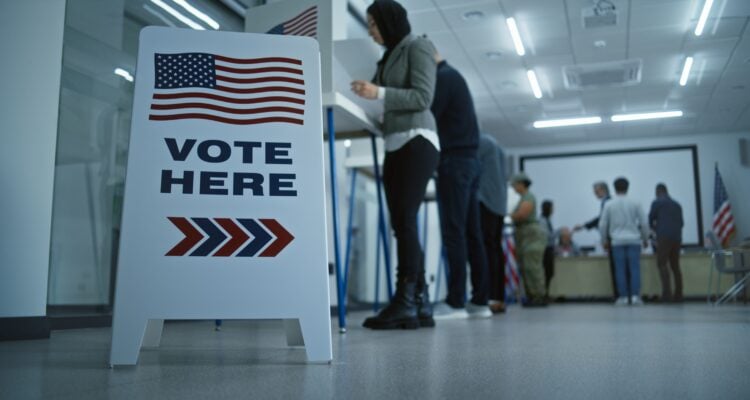Michigan has fewer electoral votes than three other of the seven swing states — Pennsylvania, North Carolina, and Georgia.
By Hugh Fitzgerald, Frontpage Magazine
Mor Shapira, an Israeli academic, has just written an article in which he accepts, and promotes, the fairy tale that “the Muslim vote may determine who will sit in the White House.”
What’s more, he says the Muslim vote has become of critical importance in other political races as well.
This preposterous claim is being pushed by Muslims, and uncritically accepted by too many others, like Mor Shapira, who fail to examine the real effect — scarcely discernible — of the relative handful of Muslim voters, who are far fewer in number than the black, Latino, and Jewish voters, to name other political blocs.
More on the claim that Muslim voters can decide the Presidential race can be found here: “For the first time, the Muslim vote may determine who will sit in the White House – opinion,” by Mor Shapira, Jerusalem Post, November 5, 2024:
For the first time, a new variable entered the US presidential election campaign in the form of the Muslim voice, which occupies a significant place and is encouraged both by the Democratic and Republican parties and by other parties (such as Jill Stein’s Green Party).
Muslims make up 1.3% of the American population. Jews make up 2.4%, which means there are 3.8 million more Jews than Muslims in this country.
Yet there is not this incessant tam-tam proclaiming that “Jews will be the decisive factor in this election.”
Those who consistently follow what is heard and written in the Arab media in the Middle East are well aware of the new voices that have been heard in the US in recent years.
Voices of those who, since October 7 and the war in Gaza and Lebanon, have been calling to “take off the gloves” and stop acting according to a party that will not see them as full partners – these are the voices of the Arabs and Muslims in the USA.
Many Muslims in the US, especially in communities in swing states like Michigan – which is seen as a key state where the Muslim community is one of the largest in the US – express deep disappointment in Biden’s foreign policy, which does not embody the long-awaited change predicted in his election campaign.
Michigan is what’s called a “battleground state,” where the vote for president is too close to call. But it is hardly the “key state” that Muslims, in playing up their own importance as a bloc in Michigan, have continued to promote.
Michigan has fewer electoral votes than three other of the seven swing states — Pennsylvania, North Carolina, and Georgia.
This policy includes continuous and unqualified support for Israel, especially in light of the war in Gaza and Lebanon, which they claim gives a “green light” to war crimes and exacerbates the plight of the Palestinians….
Under the Biden administration, there was not “continuous and unqualified support for Israel.” The Biden administration tried to prevent the IDF from entering Rafah.
It has demanded that Israel increase the amount of humanitarian aid going into Gaza to 350 trucks each day by mid-November, or face a possible cut in American military aid.
It has repeatedly tried to pressure Israel to accept a ceasefire in Gaza that would leave large numbers of Hamas combatants still standing, still able to regroup in northern Gaza and to continue hurling missiles at Jewish towns and cities, including Tel Aviv and Haifa.
If Kamala Harris loses, it won’t be because of her lukewarm support for “the Zionists” leading Muslims to withhold voting for her.
Sami Hamdi greatly exaggerates the significance of the Muslim vote —both as to its size, and as to its cohesion.
A Muslim vote for Trump belongs in the cutting-off-your-nose-to-spite-your face category. There is no reason to think that if elected, Trump’s pro-Israel policies would change, whatever the pro-Arab rhetoric he has used, in a few speeches in Dearborn, Michigan, in a misguided attempt to win Arab votes.
The author of this piece, Mor Shapira, is an Israeli lecturer in the Arabic department at Bar Ilan University and a researcher at the MEMRI Institute for the Middle East Communication.
Yet he has fallen for the preposterous claim by Muslims in America that they now have become a critical voting bloc, the indispensable group that can decide the fate of races hither and yon.
This is what Muslims want politicians to believe. But it’s all nonsense. What polls “predict that on November 5, it will be the Muslim vote that will decide the identity of the person of who will stand at the head of the leader of the free world”? Let’s see those polls, please. And as for the the prediction of Osama Siblani — the editor and publisher of the Arab American News in Dearborn, that “the future of America depends on us,” the Arabs and Muslims, it is nonsense.
What we need to keep in mind is this:
Muslims are a mere 1.3% of the American population. Much attention has focused on the Muslim vote in Michigan, simply because the “most Arab” city in America is Dearborn, Michigan.
But even in Michigan, that “Muslim vote” is also insignificant. Only 2.4% of the population in that state is Muslim.
There are 8.45 million registered voters in Michigan. Only 200,000 of them — just a little less than 2.4% — are Muslims.
This tall tale that Osama Siblani would like us all to believe — that “the future [of American politics] depends on us” (the Muslims) —is dangerous nonsense, designed to make politicians think that Muslim voters are much more significant, and therefore need to be wooed by those running for office, than is the case.





